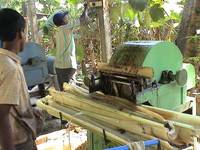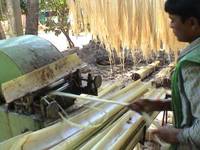 |
||||||||||||||||||||||||||||||
|
||||||||||||||||||||||||||||||
|
Crop Production |
Krishi Vigyan Kendra (KVK), Karur District |
Home.htm" target="_blank">Weather |
||||||||||||||||||||||||||||
Success Stories Title: Banana Nutri-Mix Preparation Background: Mr. Govindan and Mr. Prabakaran are the two farmers residing at Lalapettai, Karur district. Mr. Govindan is cultivating banana in an area of 4 acres under high density planting method. He has achieved good production and he is selling directly to various markets. He was very much interested to start an enterprise in addition to selling banana. By knowing through newspaper advertisements he came to know the vocational training and other service providing in agriculture and allied activities in KVK. He visited the KVK and discussed with the experts regarding vocational training on banana by-products and attended the vocational training for 30 days at Inootrimangalam village under sponsored training with the financial support of Women Development Corporation.
In the value addition training on banana, various preservative food products like jam, sauce, pickle, thokku, banana powder, chips, halva, were demonstrated. Enrichment of banana powder by inclusion of (wheat flour, green gram flour, roasted Bengal gram flour and jaggery) which is high in nutritive value is given for better product. Impact and Income Gain Training imparted on extraction of fiber from banana trunk and also demonstrated value added food products like banana jam, sauce, pickle, banana powder, thokku, halva, chips etc. After attending the training both of them started preparing banana powder with the combination of cereals at their Home. It acts as a health drink for all age group especially for growing children. The banana nutria-mix was given to his child age of 6 years and also his family members and neighbors. The family members opinioned the taste of banana nutria-mix as good, nutritious and palatable. From this they decided to start preparing and packing of powder mix with the help of family members and farm labors for assistance. Initially he spend rupees 2000 for the purchase of ingredients as bulk some quantity and utensils such as gas cylinder, spoon , tray , packing material etc. he prepared a label with the composition of the product, nutritional importance, nutritive value of the food product from the technical guidelines and information from our centre. They are selling the product in the name of “Jeyam Banana Nutri-Mix “. The prepared product selling in local markets, agricultural officers, department officials in the quantity of 250g, 500g. neatly packed in sealed plastic cover along with the label and notice at the cost of Rs.75/500 Gms. Now he is earning rupees 9000 per month of selling minimum of 150 packets per month. It is estimated that the income getting from selling of raw banana is seems to be less. When compared to selling of value added products. This improved his economic status from his additional income. Due to nutritional importance and high palatability for the children, sale seems to be high. Presently Mr. Govindan is also giving training to S.H.G. members which his wife is a S.H.G leader in his village. This helps to spread food product to various groups of people to improve their economical status. They have continuous contact in collecting technical matter and ideas often from our centre regarding quality up gradation of powder mix and also for the ideas in starting another business on fiber extraction. Banana fibre extraction- way of empowering women economically
One of the TANWA group is residing at Panikampatti village, Kulithalai taluk of Karur district. The member of TANWA group came to know KVK through agriculture department of Kulithalai. The TANWA group contacted our centre to provide vocational training to start small scale enterprises. Banana related which is the major crop in Panikampatti village. Training was conducted for a period of 30 days as on campus programme with the financial support of NABARD. The importance of banana fibre and handicraft products in dynamic marketing at out states and countries and also the preparation of value added food products were demonstrated. Totally 180 members underwent the training. Post evaluation, we assessed the interested trainees, two of the women namely Mrs. Vallinayaki and Mrs. Suganthi, were motivated them to start an enterprise on banana fibre extraction and handicraft making. After the completion of training programme at KVK, they were again sent to YMCA at Kanyakumari for further one month training on handicraft making from banana fibre and decided to start enterprise along with the group members. On the continuous follow up of our centre NABARD helped them to get a loan for buying machine. Now they are running the machine in their own farm along with the group members. Initially the extraction power of trunk fibre nearly10-15 kg per day. The extracted fibre are sold to ecogreen unit at Pollachi, Gopichettipalayam and the KVK also arranged buy back for the fibre @ Rs.55/kg and they are earned an income of Rs. 24,750 in fibre production. Apart from that they also are spreading technology to various S.H.G members by acting as technocrats for imparting training. Now they are very happy because of getting income from the additional source and they get identity in their village.
An Individual becomes an Institute Mr. N. Gopalakrishnan, a farmer, cultivating sugarcane, banana, paddy, pulses etc., in an area of 20 acres since 1980 is a resident of Panickampatti village of Kulithalai Taluk in Karur district, located 15 km away from Kulithalai. He felt reduction in productivity and profitability due to continuous deterioration of soil fertility and high input cost. In the meanwhile, he got awareness about organic farming for sustainable agriculture by maintaining soil fertility and avoids the use of synthetic compound fertilizers, pesticides, growth regulators and livestock feed additives. Hence, he changed his attitude towards organic agriculture and he has started organic farming since 1985 with an integration of agriculture, horticulture, animal husbandry, apiary and allied enterprises. He found that, vermicomposting is one of the most efficient methods of converting organic wastes and crop residues into a rich plant nutrient. He has empowered his knowledge on organic farming and vermicompost production through various organic agriculture promoting institutes and he produced vermicompost. Production of vermicompost Initially, he started vermicompost production for his own purpose, achieved higher yield than the conventional farming by proper management of soil health, and reduced the outside input usage. By seeing the success, the fellow farmers were interested to do organic farming by getting guidance and purchased the vermicompost from him. Hence the demand for vermicompost was increased. Then he thought to produce vermicompost in a large scale. During 2000 onwards, he produced and sold vermicompost commercially. During 2002, he got loan of Rs. 8.53 lakh from Kadhi Village Industries Corporation (KVIC) with the subsidy of 2.5 lakh for vermicompost production. He produced vermicompost adopting both pit method and heap method. For additional expansion of vermicompost production, he got Rs. 6.5 lakh loan from National Bank for Agriculture and Rural Development (NABARD) with the subsidy of 1.5 lakh for establishment of vermicompost production unit and vermicompost production during 2006. Apart from vermicompost production, he started to produce organic inputs like panchakavya, insect repellent, fish meal extract, egg lemon solution etc., one by one from 2005 onwards. He developed new formulation and quality packing method of panchakavya for commercial production. He produced 1000 litres of panchakavya per month and sold @ Rs. 50/lit. Fish meal extract and egg lemon solution were sold @ Rs.100/lit and Rs.150/lit respectively. Now, he is earning additional annual income of Rs. 1,80,000 from the sale of organic inputs like vermicompost, panchakavya, insect repellent, fish meal extract, egg lemon solution etc., Organic farming Association of India recognized his farm as a training centre for organic farming and from December 2008 onwards his farm is acting as training centre. Based on his technical knowledge and experience gained, he disseminated the technology through Training, Demonstration, field visit etc., both at national (No. of beneficiaries: 1, 60,000) and international level (14- times - Malaysia, Singapore, Thailand - No. of beneficiaries: 70). His innovation and contribution towards organic agriculture were published in various magazines, dailies both in Tamil and English. He gave live programmes in All India Radio, Trichy Doordarshan Kendra, Chennai and Makkal TV on Vermicompost production and Organic input production technologies. He gave training to Assistant Agricultural Officers, College students, Self Help Groups etc., on vermicompost production technologies and organic farming techniques. He has received the award of Manpuzhu Nibunarby theTamil Nadu Pollution Board. He has demonstrated and explained about vermicompost production and panchakavya production at Rashtrapathi Bhavan during 2006-07 in the presence of Dr.A.P.J. Abdul Kalam. He shared his experience and discussed about natural farming with Masana Fukkako, Japanise Scientist of Natural Farming. He was popularly called as Manpuzhu Nibunar ( Earthworm expert) by the people. Now he has developed an institute to promote organic agriculture in the name of RADIO (Rural Agriculturalist Development Integrative Organization). |
||||||||||||||||||||||||||||||
Special Technologies |
||||||||||||||||||||||||||||||
 |
||||||||||||||||||||||||||||||
Home | About Us | Success Stories | Farmers' Association | Farmers' Innovation | Publications | FAQs | Contact
© 2013 TNAU. All Rights Reserved. |
||||||||||||||||||||||||||||||


